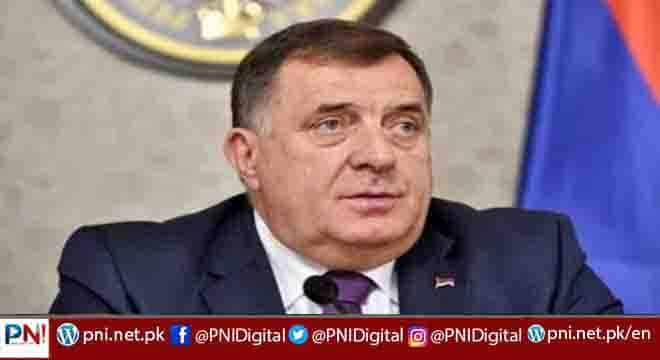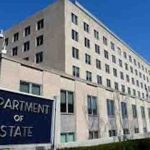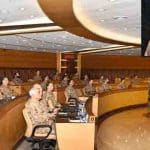Washington, Jan 5 (AFP/APP):The United States on Wednesday slapped sanctions on Bosnian Serb leader Milorad Dodik and a television network close to him, ramping up pressure on fears his secessionist moves will undo a fragile 25-year-old peace.
“Milorad Dodik’s destabilizing corrupt activities and attempts to dismantle the Dayton Peace Accords, motivated by his own self-interest, threaten the stability of Bosnia and Herzegovina and the entire region,” Brian Nelson, the under secretary of the treasury for terrorism and financial intelligence, said in a statement.
Dodik, a former social democrat turned nationalist with ties to Russia, has increasingly made good on longstanding secession threats of the Republika Srpska, the Bosnian Serb entity created under the US-brokered 1995 Dayton Accords that ended the former Yugoslav republic’s brutal war.
Calling the united Bosnia a failure, Dodik moved last month to withdraw Bosnian Serbian institutions including the army, the judiciary and the tax system from central authority.
Secretary of State Antony Blinken, vowing to back the “sovereignty and territorial integrity” of Bosnia, also announced that the United States would ban visas for two other leaders over corruption allegations.
They are Milan Tegeltija, an adviser to Dodik who formerly served on a body that names Bosnia’s judges, and Mirsad Kukic, a Bosniak party leader accused in a graft scandal over a public power company.
The sanctions against Dodik will criminalize any transactions including donations for him from the United States.
He was already hit by sanctions that block any assets he holds in the United States, a measure taken in the last days of Barack Obama’s presidency after Dodik defied a court order.
Also slapped with sanctions Wednesday was Alternativna Televizija, a prominent television network in the Bosnian Serb stronghold of Banja Luka that is owned by a company linked to Dodik’s son.
– Defiance and Western fears –
Dodik remained defiant as the new sanctions were announced.
“If they think that they will discipline me like this, they are grossly mistaken,” Dodik told a local media outlet.
Dodik has brushed aside US pressure repeatedly in the past, saying last month when he announced his secessionist measures, “I’m not afraid of sanctions.”
After a September 30 telephone conversation with US envoy Gabriel Escobar, Dodik said, “It is absolutely inappropriate to threaten me with sanctions from his country. I’m already under sanctions and nothing serious has happened to me.”
The latest sanctions show the growing worry in the West that Bosnia’s complicated peace accord risks unraveling after Dodik ignored warnings from the United States and European leaders to back down.
Dodik met last month in Moscow with Russian President Vladimir Putin, appearing to indicate support for his moves by the Serbs’ historically.
Dodik’s “divisive ethno-nationalistic rhetoric reflects his efforts to advance these political goals and distract attention from his corrupt activities,” a Treasury Department statement said.
His actions “threaten the stability, sovereignty and territorial integrity” of Bosnia and “undermine the Dayton Peace Accords, thereby risking wider regional instability,” it said.
The Dayton Accords ended a war that claimed some 100,000 lives, brought accusations of genocide against Bosnian Serb forces and traumatized a post-Cold War Europe that had hoped the continent had finally turned the page on centuries of bloodletting.
Brokered at the Dayton air base in Ohio by the flamboyant late US diplomat Richard Holbrooke, the accord effectively split the country in two, giving one half to the Bosnian Serbs and the other to a Muslim-Croat federation.
A dizzying bureaucracy links the two sides in a unitary state that has succeeded in preventing any wide scale return to inter-communal violence.
Follow the PNI Facebook page for the latest news and updates.









